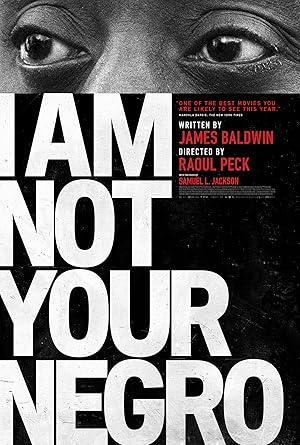
I Am Not Your Negro Page #2
I am about seven.
I'm with my mother, or my aunt.
The movie is
Dance, Fools, Dance.
I was aware that Joan Crawford
was a white lady.
and a colored woman who, to me,
looked exactly
like Joan Crawford,
was buying something.
She was incredibly beautiful.
She looked down at me
with so beautiful a smile
that I was not even embarrassed,
which was rare for me.
By this time,
I had been taken in hand
by a young white schoolteacher
named Bill Miller,
a beautiful woman,
very important to me.
She gave me books to read and
talked to me about the books,
and about the world:
about Ethiopia, and Italy,
and took me to see
plays and films,
to which no one else
would have dreamed
of taking a ten-year-old boy.
It is certainly
because of Bill Miller,
who arrived
in my terrifying life so soon,
to hate white people.
Though, God knows,
more than one or two.
Therefore, I begin to suspect
that white people
did not act as they did
because they were white,
but for some other reason.
I was a child of course,
and therefore unsophisticated.
I took Bill Miller as she was,
or as she appeared to be to me.
She too, anyway,
was treated like a n*gger,
especially by the cops,
and she had no love
for landlords.
Richard!
Can't get him up!
Richard!
Can't get him up!
Richard!
Can't get him up!
Lazy Richard!
Can't get him up!
Richard!
In these days,
no one resembling my father
has yet made an appearance
Can't get him up!
We'll try to get him
on the phone
I was laying down
dreamin'...
No, it's not entirely true.
There were, for example,
Stepin Fetchit and Willie Best
and Mantan Moreland,
all of whom, rightly or wrongly,
I loathed.
It seemed to me that they lied
about the world I knew,
and debased it,
and certainly I did not know
anybody like them,
as far as I could tell.
For it also possible that
their comic, bug-eyed terror
contained the truth
concerning a terror
by which I hoped
never to be engulfed.
Yet, I had no reservations
at all concerning the terror
of the Black janitor
in They Won't Forget.
Give me police!
Give me police!
Give me...
Give me police!
I think that it was
a black actor
named Clinton Rosemond
who played this part,
and he looked
a little like my father.
I didn't do it. I didn't do it!
I didn't do it! I didn't do it!
He is terrified
has been raped and murdered,
and her body has been found
upon the premises
of which he is the janitor.
Translation
Translate and read this script in other languages:
Select another language:
- - Select -
- 简体中文 (Chinese - Simplified)
- 繁體中文 (Chinese - Traditional)
- Español (Spanish)
- Esperanto (Esperanto)
- 日本語 (Japanese)
- Português (Portuguese)
- Deutsch (German)
- العربية (Arabic)
- Français (French)
- Русский (Russian)
- ಕನ್ನಡ (Kannada)
- 한국어 (Korean)
- עברית (Hebrew)
- Gaeilge (Irish)
- Українська (Ukrainian)
- اردو (Urdu)
- Magyar (Hungarian)
- मानक हिन्दी (Hindi)
- Indonesia (Indonesian)
- Italiano (Italian)
- தமிழ் (Tamil)
- Türkçe (Turkish)
- తెలుగు (Telugu)
- ภาษาไทย (Thai)
- Tiếng Việt (Vietnamese)
- Čeština (Czech)
- Polski (Polish)
- Bahasa Indonesia (Indonesian)
- Românește (Romanian)
- Nederlands (Dutch)
- Ελληνικά (Greek)
- Latinum (Latin)
- Svenska (Swedish)
- Dansk (Danish)
- Suomi (Finnish)
- فارسی (Persian)
- ייִדיש (Yiddish)
- հայերեն (Armenian)
- Norsk (Norwegian)
- English (English)
Citation
Use the citation below to add this screenplay to your bibliography:
Style:MLAChicagoAPA
"I Am Not Your Negro" Scripts.com. STANDS4 LLC, 2024. Web. 25 Apr. 2024. <https://www.scripts.com/script/i_am_not_your_negro_10455>.


Discuss this script with the community:
Report Comment
We're doing our best to make sure our content is useful, accurate and safe.
If by any chance you spot an inappropriate comment while navigating through our website please use this form to let us know, and we'll take care of it shortly.
Attachment
You need to be logged in to favorite.
Log In